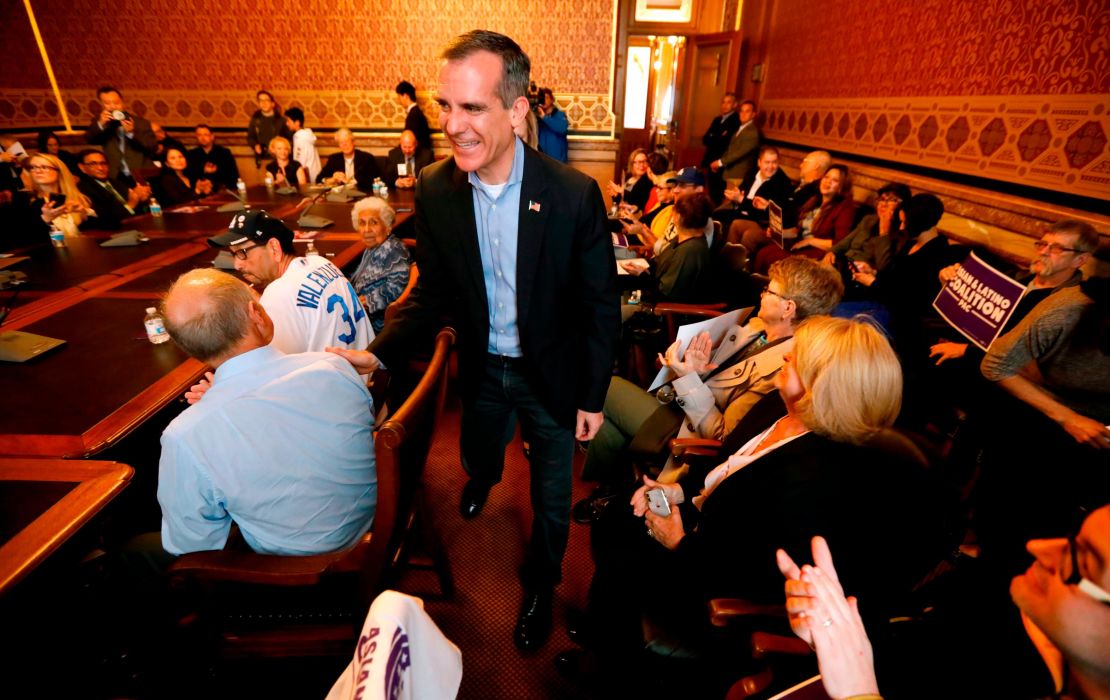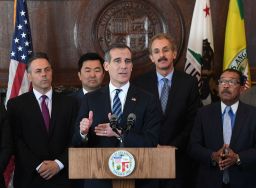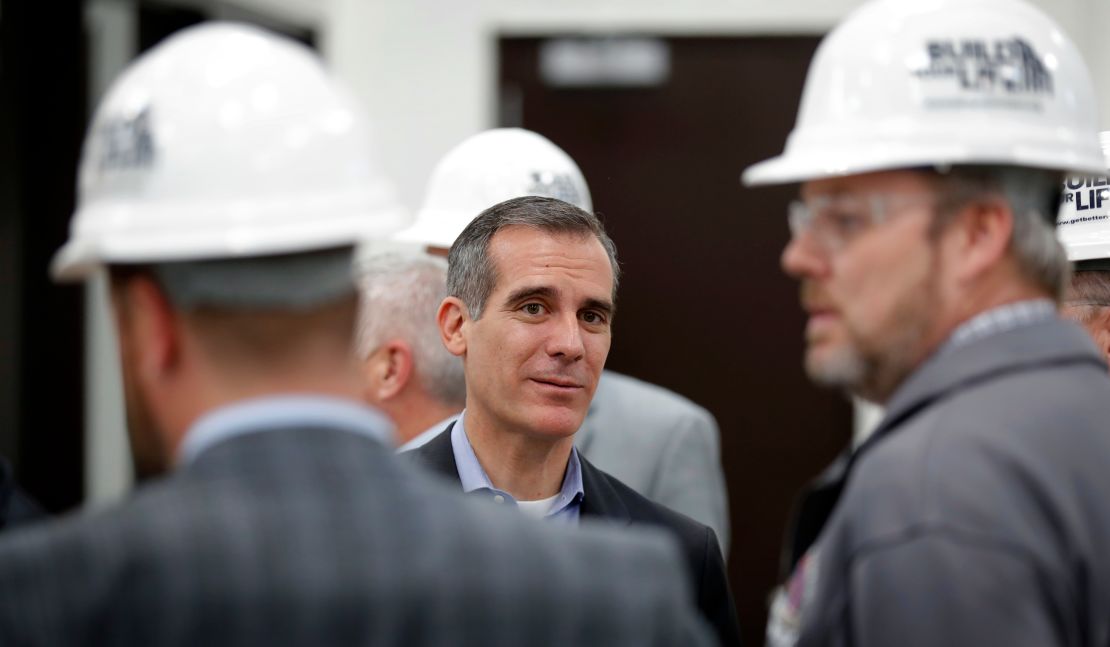Eric Garcetti isn’t exactly a natural fit in Iowa.
The mayor of Los Angeles, a diverse and liberal city, recently traveled to the overwhelmingly white and politically much more conservative state, where political activists are already gearing up for the first-in-the-nation caucuses that will unfold less than two years from now.
He introduced himself to Democratic activists at Cooney’s Tavern as the grandson of a Mexican immigrant who became a citizen “because this country said there was a place in it for him.” He joked about his heritage as “just your average Mexican-American-Jewish-Italian,” reviving a line from his speech at the 2016 Democratic National Convention.
Garcetti’s complex identity is what sets him apart in what will likely become the largest and most diverse field of Democratic presidential candidates in generations.
He’s a Jewish-Mexican-American with blue-collar roots who tries to connect by describing his childhood neighborhood as “middle America in LA.” He’s also a Rhodes Scholar with undergraduate and master’s degrees from Columbia University who studied at the London School of Economics and went on to become mayor of a city that is home to the wealthy, famous and liberal elite. His father was the Los Angeles district attorney who unsuccessfully prosecuted OJ Simpson.
On his first tour of Iowa as a potential 2020 contender, Garcetti attempted to link his background to the experience of Iowans, who will drive the early race for Democratic presidential nomination. He insists that Angelenos share the same aspirations and concerns as Iowans — noting that he is grappling with crumbling infrastructure, traffic, and a severe homelessness crisis in his own city as mayor.
He is unquestionably a long shot. No mayor has ever gone straight from City Hall to the White House. And the 47-year-old mayor is not yet igniting rooms with his unique personal story the way the young Barack Obama did.
But in interviews with dozens of voters while traveling with Garcetti across the early presidential contest states of New Hampshire, South Carolina and Iowa, his potential to become a major contender was apparent. Voters often said they liked how Garcetti used the story of his grandfather, the Mexican immigrant to the US who fought in World War II and opened his own barbershop, as a touchstone to explain his family’s values and their American story.
“Now I’m here today, the grandson of that man, as mayor of the largest city in the largest state in this country,” Garcetti told the crowd Cooney’s Tavern. “The next grandpa Sal — whether they’re coming from Mexico, or they are coming from the Midwest — deserves to make sure that their future is as bright as his was, and ours can be once again.”
The context is clear: Garcetti doesn’t think America has lived up to that promise with Donald Trump in the White House. Though Trump won over middle-class voters who liked his authenticity, the Los Angeles mayor argues that the President’s assurances that he would help those voters have proved hollow.
“We’ve got somebody who is playing with our lives in the White House — who doesn’t care what the price of soybeans are; who doesn’t care if that steel is more expensive for our carpenters,” Garcetti said, alluding to Trump’s tariffs and impact that China’s retaliatory measures could have on Iowa. “He’s disconnected and he’s divisive. We, on the other hand, are people who care.”
It’s a message that Garcetti is using for the 2018 midterm elections, and it’s perhaps the outline of a broader message for a 2020 presidential run.
He tried it out in South Carolina in February, where longtime Democratic organizer Bernice G. Scott — a stalwart of Democratic politics in the Palmetto State — helped wrangle voters to a barbecue buffet dinner to hear him speak. Scott wasn’t sure what to expect. After his talk at a community center outside of Columbia, she invited him to lunch at her house on his next visit to lower Richland County.
“It’s not where you come from,” she says when asked whether Garcetti’s Los Angeles background would be a hurdle for him. “It’s how you can use your background and your experience to help other people who don’t have that.”
“There’s an understanding that where he came from, there are the same roots and values that we have; the value of helping someone — don’t care if you’re rich, poor, black, white, Hispanic,” Scott said.
She paused for a minute: “I felt like I knew him a long time, and this is the first time I met him.”
From the Valley to the White House
The joke about Garcetti’s background at City Hall is that the mayor is “1/8 everything.” He grew up eating menudo, a traditional Mexican soup, on weekends in his grandmother’s kitchen. On the Jewish side, it was bagels on Saturday and hanging out with his cousins. He said: “That just seemed normal.”
While Salvador Garcetti was trained as a union barber, Garcetti’s grandmother worked as a meatpacker. His maternal grandparents fled persecution as Jews in Eastern Europe. His grandfather on his mother’s side became a tailor, who ended up cutting suits for Jack Valenti and later President Lyndon B. Johnson.
Garcetti’s father, Gil Garcetti, did not run for county district attorney until Garcetti was in college. The elder Garcetti noted that the family moved from their 3-bedroom house in a middle-class section of Encino to the tony neighborhood of Brentwood when Garcetti was in high school. (Gil Garcetti ultimately switched careers to become a photographer).
“I think everyone has the impression that LA is Hollywood and fast lives,” the Los Angeles mayor said in an interview in March while giving CNN a driving tour of his childhood hang outs. “That couldn’t be further from the truth. … Nobody knew who we were.”
Garcetti is highlighting that notion, as well his grandparents’ blue-collar story, in part to untangle himself from the image of Los Angeles as the glittering mecca of wealth and celebrity life. He draws laughter with what has become his signature line: LA is just like the rest of America, with a few more Kardashians in the mix.

Garcetti acknowledges the opportunities that he had as a child, including attending what is now known as Harvard-Westlake, one of the best private high schools in Los Angeles. But he argues that his values are rooted in his early experiences as a kid from a middle-class neighborhood in the San Fernando Valley who loved baseball and playing Galaga at the arcade.
Over a chili cheeseburger at Tommy’s Burgers, one of his boyhood haunts, Garcetti described his family’s neighborhood nearby as “middle America in LA” – a place once dotted with orange groves and factories, where you could get a “decent home for a reasonable price.”
“It was literally where ‘The Brady Bunch’ was filmed. So it kind of felt like everywhere and nowhere. It was anonymous America,” he said. “It just kind of shaped who I was – that you could walk to your Little League. It was small-town America in what wound up, as I grew up realizing, was a really big city.”
Music was also an integral part of Eric Garcetti’s childhood, with three pianos in the family’s home. Gil Garcetti encouraged his son to pursue a career as a jazz pianist after Oxford. Garcetti didn’t, but he still composes music on the Knight upright piano in his City Hall office.
“It takes him to a different place. It clears his mind,” Gil Garcetti said during an interview with CNN on a recent afternoon outside LA’s Museum of Natural History, where he was photographing the antiquities in the King Tut exhibition for a new book.
A zen approach to Trump
Democrats are still wrestling with the lessons of their loss in 2016, and many are concerned about not repeating the same mistakes when they choose their nominee.
Garcetti vs. Trump would be a striking contrast. The progressive LA mayor quotes Dostoyevsky and Eleanor Roosevelt on the campaign trail and transitions smoothly from English to Spanish in his speeches.
Over his career in LA city politics, he has developed a loyal following among California Democrats as a deep thinker, a feminist, an environmentalist and a fierce advocate for LGBT rights, who pushed to raise the minimum wage in Los Angeles to $15 an hour and make community college free.
He enlisted in the US Naval Reserve in 2005 while serving on the Los Angeles City Council and served as an intelligence officer for 12 years.
At Columbia, his longtime friend Ben Jealous, the former head of the National Association for the Advancement of Colored People (who is running for governor of Maryland), recalled in an interview how Garcetti helped start a group called Black Men for Anita Hill with one of their professors.
The two friends organized a local boycott in the neighborhood surrounding Columbia to force local store owners to accept cans from homeless people. They also started a group aimed toward creating a safe space for gay and bi-sexual men to have discussions – “this was 25 years ago,” Jealous noted.
“Eric’s secret power is humility,” Jealous said in a recent telephone interview. “You expect him to be arrogant.”
During his student years, Garcetti did humanitarian work in Ethiopia and organized dissidents in Burma. He later taught human rights and political science at Occidental College and has visited more than 80 countries across the world. He and his wife, Amy Elaine Wakeland, a fellow Rhodes Scholar and activist, who he met on the plane to Oxford, are competing over who can visit all of them first.
When Garcetti was campaigning to bring the Olympics to LA in 2028, he won over International Olympic Committee members by greeting them in their native languages, including a few lines of Amharic to the member from Ethiopia.
As mayor, Garcetti has used his family history to connect with the city’s huge population of undocumented immigrants. He has actively opposed the Trump administration’s expedited deportations, pointing out the public policy consequences of the families that have been broken up in LA. He directed his Office of Immigrant Affairs to help connect undocumented immigrants with non-profit groups that offer legal aid.
While other 2020 contenders are quick to show their rage at the President, Garcetti has taken a more zen approach, urging his fellow Democrats not to waste time responding to each provocative tweet.
In places like South Carolina, he urges his listeners not to take Trump’s bait.
“In this moment, when the President is defining himself by how he can divide us and scare us, we have to stop yelling at the television and stop screaming at the Facebook feed and get to work and win some elections,” he told the crowd who listened to him speak over a plated dinner of barbecue and greens in lower Richland County.
He rejects the notion that he’s been any less strident than other leading 2020 Democrats like US Senators Cory Booker, a fellow Rhodes scholar, and Kamala Harris, noting his own impassioned speeches at venues like the women’s marches in Los Angeles.
“On any given day, you can portray any of us as firebrands or thoughtful deliberators,” he said. He sees little point debating who would be Trump’s fiercest critic in 2020. As Democrats, he says, “The more we’re obsessed with ourselves, the more we’re going to lose.”
Garcetti’s challenges
One of the reasons that Garcetti seems to connect is that he does not boast about his elite resume on the trail. He often says Democrats ought to stop acting like “the smarty-pants party” and “speak English” to voters (Dostoevsky quotes aside).
He focuses instead on his infrastructure accomplishments in Los Angeles to address the city’s horrific traffic — how he championed Measure M, a voter-approved sales tax increase that will raise $120 billion over 40 years for traffic improvements.
In the year of #MeToo and female empowerment, the Los Angeles mayor notes that he insisted since he was elected that more than 50% of the city’s commissioners are women. He hired his long-time chief of staff, Ana Guerrero, the activist daughter of migrant farm workers, when she did not yet have a college degree. He continued to promote her even as she warned him that her time would be constrained as a single mother.
“He walks the walk,” Guerrero said in an interview in her office.
Homelessness is now, by far, the biggest crisis gripping the city and the most visible problem facing Garcetti, as he attempts to position himself for a presidential run.

About 34,000 people in LA were homeless in 2017, and the size of the population rose by 20% from 2016 to 2017, according to the city’s annual homeless count. (More than a fifth of those people became homeless for the first time over that 2016-2017 year).
Perhaps most stunning, there was a 41% spike in homelessness among children countywide.
Tent encampments spread out on sidewalks across the city, far beyond the dystopian scene on Skid Row where the population was once concentrated. Within Skid Row, violent crime is still rampant, and needles and trash still cover the sidewalks.
Throughout the city, freeway ramps are littered with trash, which the city is slow to clean up because officials must first verify that they are not throwing away the property of the people who live in nearby tents.
The problem has tentacles far beyond the welfare of those living on the streets. The huge fire that swept through the hillsides along the 405-freeway last December, destroying homes in Bel Air, began with a cooking stove fire at a homeless encampment.
Garcetti’s recent “State of the City” speech centered on his vow to end homelessness in Los Angeles, but some activists fault him for not becoming more focused on the issue sooner.
Los Angeles voters approved Proposition HHH in November of 2016 to provide $1.2 billion for permanent housing over a decade. Garcetti’s goal is 10,000 units of permanent supportive housing over the next 10 years.
Guerrero said one aspect of the challenge that they tackled first was streamlining communication between city and county, which handles health and welfare, convening all of the players from law enforcement, to sanitation officials, to service providers who are experimenting with pilot programs for “tiny houses” and other temporary shelter.
“I want the war room,” Garcetti told Guerrero. He governs in that style, Guerrero said, fostering Socratic method-style discussions where aides are encouraged to argue against themselves.
When asked about the criticism that he did not do enough on the homelessness issue in his first few years as mayor, Garcetti notes that the city helped house 8,400 veterans since he took office, and that the dollars for permanent supportive housing from the ballot measure just began to flow last October.
In his State of the City address, he also noted that there was less than $20 million in the city’s budget for homelessness four years ago. This week, he included $430 million directed toward the crisis in his budget proposal.
Road to a decision
The last stop on Garcetti’s recent tour of his childhood haunts is Tapia Farms in the Valley, which has some of the last acres of surviving farm land in the city of Los Angeles. There’s a crowd for “Tomato-mania,” but the LA Mayor wanders inconspicuously to the farm stand’s counter until he’s recognized by one of the cashiers.
When Garcetti and his wife Amy lived in their own house in Silver Lake (which was featured in Dwell Magazine) they used their green thumbs to create an expansive kitchen garden. But at the mayor’s official residence in LA, which is known as “Getty House,” it’s all hydroponics, so tomato seedlings are off the table.
Garcetti calls Amy – who he describes as his love, his partner and his “No person” – to ask what he can bring home. He picks up a flat of ripe strawberries, pays with cash, and then heads out to pick up his 6-year-old daughter Maya.
That sort of Sunday normalcy would fade away quickly if Garcetti decides to run for president.

Most Democratic strategists say that in order to be competitive, the candidates will have to make a firm decision on whether to run between the 2018 midterm election in November and the New Year.
The LA Mayor says he’ll make the decision about whether to run for president by talking to voters in places like Iowa, Nevada and South Carolina.
“Ninety-five percent of my work is being mayor,” Garcetti said. “But that 5% that nags at all of us — of what’s going wrong in this country — I think is best thought out not in your own head, but by getting out there, being out there, and listening to Americans.”
If he were elected president, Garcetti would have to leave in the middle of his second term. I ask what he feels he’d have to accomplish before he’d be comfortable leaving City Hall.
“I think I’ll be sad that there’s always works left undone,” he says, while leaning against his car outside the batting cages where he and his friends used to hit fastballs in the Valley.
“I took the baton from folks who came before me — who started the transportation investments; who began to reimagine our airport; who started investing in jobs and better education — and I’m going to have to do the same for someone else.”
“I want to turn momentum on traffic. I want to make in a dent in homelessness on the way to eradicating it on our streets,” Garcetti said. “But there’s always something else to do tomorrow. And you have to be at peace knowing you’re not going to finish it all.”

